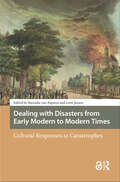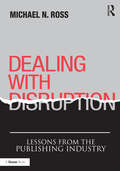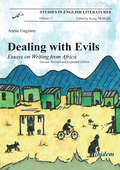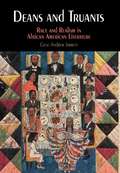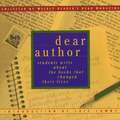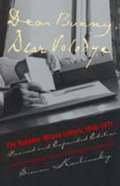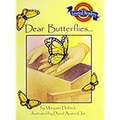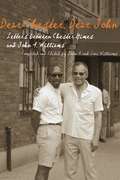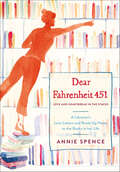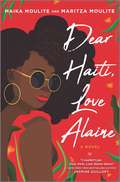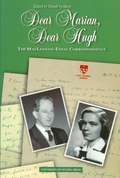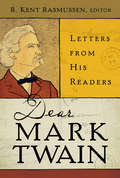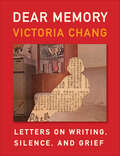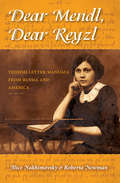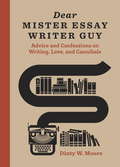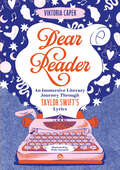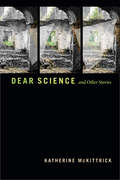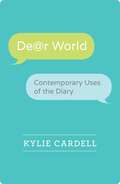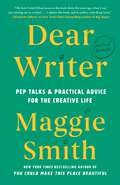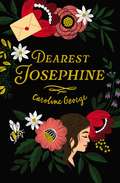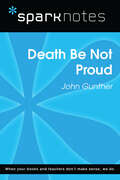- Table View
- List View
Dealing with Dark Pasts: A European History of Auto-Critical Memory in Global Perspective (Elements in Historical Theory and Practice)
by Itay LotemSince the end of the Second World War, the political rationale to remember the past has shifted from previous focus on states' victories, as these began commemorating their own historical crimes. This Element follows the rise of 'auto-critical memory', or the politics of remembrance of a country's own dark past. The Element explores the idea's gestation in West Germany after the Second World War, its globalisation through initiatives of 'transitional justice' in the 1990s, and present-day debates about how to remember the colonial past. It follows different case studies that span the European continent – including Germany, France, Britain, Poland and Serbia – and places these in a global context that traces the circulation of ideas of auto-critical memory. Ultimately, as it follows the emergence of demands for social and racial justice, the Element questions the usefulness of memory to achieve the goals many political actors ascribe to it.
Dealing with Disasters from Early Modern to Modern Times: Cultural Responses to Catastrophes (Disaster Studies)
by Hanneke van Asperen and Lotte JensenDisasters are as much cultural as natural phenomena. For centuries, news about catastrophic events has been disseminated through media such as chronicles, pamphlets, newspapers, poems, drawings, and prints. Nowadays, we are overwhelmed with news about the cataclysmic effects of recent forest fires, floods, and storms. Due to the ongoing climate crisis, extreme weather events will likely have ever greater impacts on our lives. This volume addresses cultural representations of catastrophes such as floods, epidemics, and earthquakes over the centuries. In the past as now, artists and authors try to make sense of disasters, grasp their impact, and communicate moral, religious, or political messages. These creations reflect and shape how people learn and think about disasters that occur nearby or far away, both in time and space. The parallels between past and present underline how this book contributes to modern debates about cultural and creative strategies in response to disasters.
Dealing with Disruption: Lessons from the Publishing Industry
by Michael N. RossPublishing today requires a presence in local and global markets, and successful publishers can be more effective in reaching both by employing current technology at all stages of the publishing process. Finding the most efficient and profitable business models has become more challenging (and more rewarding) by the same advancements in technology. Michael Ross provides a roadmap to the essential aspects of the international publishing industry, from how to develop content that can be easily adapted to other cultures, to establishing relationships and negotiating licensing and co-publishing contracts. With a discussion of the critical innovations in the industry and through case studies from all stages in the publishing process, the book provides insights into the maturing of digital publishing and the challenges and opportunities provided by new technologies. Many publishing models have emerged over the last 15 years, and technology has made the mechanics of publishing in general, and web publishing in particular, easier. Thus, the role of the professional publisher is being challenged, and issues of quality and trust are now competing with easy access to information. Publishing, in all forms, can be viewed as a conspicuous bellwether for any business that must make strategic and tactical adjustments quickly to innovate and grow. Ross applies principles from both consumer and educational publishing to explore publishing's ongoing 'sea change' and its implications for other industries.
Dealing with Evils: Essays on Writing from Africa (Studies in English Literatures #11)
by Annie GagianoAnnie Gagiano addresses more than twenty texts from various African regions and periods, ranging from transcriptions of ancient folktales to classic African English texts and recent writings on social and gender issues. Gagiano focuses on these texts' engagement with the forces that damage and threaten life in Africa and these authors' political courage, social concern, and subtle delineation of their characters' experiences. A new preface and several new essays bring the collection up to date with the latest developments in the field.
Deans and Truants
by Gene Andrew JarrettFor a work to be considered African American literature, does it need to focus on black characters or political themes? Must it represent these within a specific stylistic range? Or is it enough for the author to be identified as African American? In Deans and Truants, Gene Andrew Jarrett traces the shifting definitions of African American literature and the authors who wrote beyond those boundaries at the cost of critical dismissal and, at times, obscurity. From the late nineteenth century to the end of the twentieth, de facto deans--critics and authors as different as William Howells, Alain Locke, Richard Wright, and Amiri Baraka--prescribed the shifting parameters of realism and racial subject matter appropriate to authentic African American literature, while truant authors such as Paul Laurence Dunbar, George S. Schuyler, Frank Yerby, and Toni Morrison--perhaps the most celebrated African American author of the twentieth century--wrote literature anomalous to those standards.Jarrett explores the issues at stake when Howells, the "Dean of American Letters," argues in 1896 that only Dunbar's "entirely black verse," written in dialect, "would succeed." Three decades later, Locke, the cultural arbiter of the Harlem Renaissance, stands in contrast to Schuyler, a journalist and novelist who questions the existence of a peculiarly black or "New Negro" art. Next, Wright's 1937 blueprint for African American writing sets the terms of the Chicago Renaissance, but Yerby's version of historical romance approaches race and realism in alternative literary ways. Finally, Deans and Truants measures the gravitational pull of the late 1960s Black Aesthetic in Baraka's editorial silence on Toni Morrison's first and only short story, "Recitatif."Drawing from a wealth of biographical, historical, and literary sources, Deans and Truants describes the changing notions of race, politics, and gender that framed and were framed by the authors and critics of African American culture for more than a century.
Dear Ally, How Do I Write a Book?
by Ally CarterProblem plot lines? Character chaos? Ask Ally! The definitive guide to writing from one of teen fiction's best-loved authors.Writing finally has its own agony aunt in bestselling author, Ally Carter. Always wanted to write? Not sure how to begin, or what to do with tricky characters or pesky plotlines? Ask Ally! Ally Carter is the internationally bestselling author of Gallagher Girls, Embassy Row and Heist Society. Known for her gripping plots and adventures that combine danger and glamour in equal measure, Ally knows how to write brilliant books for teen and YA readers.Now Ally and her author friends want to help YOU write the book you've always dreamed of. Part agony aunt, part writing guru, this writing guide is thoughtful, witty and best of all, useful.With advice from some of children's fiction's brightest stars including Holly Black, Cassandra Clare and Kody Keplinger.
Dear Ann, Dear Abby: An Unauthorized Biography
by Bob Speziale Jan PottkerWith chutzpah, hard work, controversy, and a large bit of luck, identical twins Esther Pauline (Eppie) and Pauline Esther (Popo) Friedman rose from smalltown Iowa obscurity to unprecedented national fame and influence. As Ann Landers and Abigail Van Buren, two of the most loved, admired, and important women in the United States, they have articulated and often shaped America’s moral conscience for over thirty years. Despite the roadblocks put up by the twins to preserve their mystique, the authors interviewed several hundred friends and colleagues who knew Ann and Abby at various stages of their lives. These candid and revealing recollections, often contradicting the twins’ “endorsed” publicity, recreate the fascinating lives and careers of the women whose advice appears in more than two thousand newspapers. Dear Ann, Dear Abby uncovers the forces that propelled two fifties-era housewives into identical, highly influential careers, and the truth behind their private and public lives. It also examines the reasons why the twins repeatedly and openly feud with each other while giving human relations advice to millions, and how their enormous influence with the media has allowed them to escape close scrutiny--until now.
Dear Author: Students Write About the Books That Changed Their Lives
by The Editors at Weekly Reader's Read MagazineWeekly Reader's Read magazine, with the Library of Congress held a contest asking junior high and high school students to write to the author of the book that has most influenced their lives. Dear Author includes eloquent and touching letters, with brief biographies of the chosen authors listing additional titles they've published. Enduring classics are mixed with contemporary favorites, among them letters to Maya Angelou, Hemingway, Anne Frank, Judy Blume, Alex Haley, Steinbeck, Charles Dickens, J. R. R. Tolkien, Dr. Zeus, Toni Morrison, J. D. Salinger, Willa Cather, Charlotte Bronté, and Thoreau. This book affirms the power of literature to affect today's youth and demonstrates that reading will never go out of style. It is for every young adult and anyone who has loved a book and wants to discover other captivating and influential authors. In their letters, the young writers address the authors as role models, heroes and friends, discussing very personal issues in their lives like divorce, loneliness, anger, aspirations and evolving values. Many picked up a book expecting to be bored and finished it alight with enthusiasm, a sense of accomplishment and a new respect for the value of books. The clear and useful index has been included.
Dear Bunny, Dear Volodya: The Nabokov-Wilson Letters, 1940-1971 (revised and expanded)
by Vladimir Nabokov Edmund Wilson Simon KarlinskyTracing in detail two decades of close friendship between Vladimir Nabokov and Edmund Wilson, this collection has been expanded to include 59 letters discovered subsequent to the book's original publication in 1979.
Dear Chester, Dear John: Letters between Chester Himes and John A. Williams
by John A. Williams Lori WilliamsChester Himes and John A. Williams met in 1961, as Himes was on the cusp of transcontinental celebrity and Williams, sixteen years his junior, was just beginning his writing career. Both men would go on to receive international acclaim for their work, including Himes's Harlem detective novels featuring Grave Digger Jones and Coffin Ed Johnson and Williams's major novels The Man Who Cried I Am, Captain Blackman, and Clifford's Blues. Dear Chester, Dear John is a landmark collection of correspondence between these two friends, presenting nearly three decades worth of letters about their lives and loves, their professional and personal challenges, and their reflections on society in the United States and abroad. Prepared by John A. Williams and his wife, Lori, this collection contains rare and personal glimpses into the lives of Williams and Himes between 1962 and 1987. As the writers find increasing professional success and recognition, they share candid assessments of each others' work and also discuss the numerous pitfalls they faced as African American writers in the publishing world. The letters offer a window into Himes's and Williams's personalities, as the elder writer reveals his notoriously difficult and suspicious streak, and Williams betrays both immense affection and frustration in dealing with his old friend. Despite several rifts in their relationship, Williams's concern for Himes's failing health ensured that the two kept in touch until Himes's death. Dear Chester, Dear John is a heartfelt and informative collection that allows readers to step behind the scenes of a lifelong friendship between two important literary figures. Students and teachers of African American literature will enjoy this one-of-a-kind volume.
Dear Fahrenheit 451: Love and Heartbreak in the Stacks
by Annie Spence“A winsome volume . . . in which the librarian Annie Spence writes letters to books she has loved, or not.” —New York Times Book ReviewIf you love to read, and presumably you do since you’ve picked up this book, you know that some books affect you so profoundly they forever change the way you think about the world. Some books, on the other hand, disappoint you so much you want to throw them against the wall. Either way, it’s clear that a book can be your new soul mate or the bad relationship you need to end.In Dear Fahrenheit 451, librarian Annie Spence has crafted love letters and breakup notes to the iconic and eclectic books she has encountered over the years. From breaking up with The Giving Tree (a dysfunctional relationship book if ever there was one), to her love letter to The Time Traveler’s Wife (a novel less about time travel and more about the life of a marriage, with all of its ups and downs), Spence will make you think of old favorites in a new way. Filled with suggested reading lists, Spence’s take on classic and contemporary books is very much like the best of literature—sometimes laugh-out-loud funny, sometimes surprisingly poignant, and filled with universal truths.“Terrifically funny.” —Library Journal, starred review“A smart, funny, forthright librarian in book form.” —Kirkus Reviews“Dear Dear Fahrenheit 451, thanks for the lovely reminder of the ways we find ourselves in books.” —Booklist, starred review“[Spence] has a unique ability to capture the thoughts and feelings of book lovers.” —NPR
Dear Haiti, Love Alaine
by Maika Moulite Maritza MouliteWhen a school presentation goes very wrong, Alaine Beauparlant finds herself suspended, shipped off to Haiti and writing the report of a lifetime… <P><P>You might ask the obvious question: What do I, a seventeen-year-old Haitian American from Miami with way too little life experience, have to say about anything? <P><P>Actually, a lot. <P><P>Thanks to “the incident” (don’t ask), I’m spending the next two months doing what my school is calling a “spring volunteer immersion project.” It’s definitely no vacation. I’m toiling away under the ever-watchful eyes of Tati Estelle at her new nonprofit. And my lean-in queen of a mother is even here to make sure I do things right. <P>P>Or she might just be lying low to dodge the media sharks after a much more public incident of her own…and to hide a rather devastating secret. <P><P>All things considered, there are some pretty nice perks…like flirting with Tati’s distractingly cute intern, getting actual face time with my mom and experiencing Haiti for the first time. I’m even exploring my family’s history—which happens to be loaded with betrayals, superstitions and possibly even a family curse.You know, typical drama. But it’s nothing I can’t handle.
Dear Marian, Dear Hugh: The Maclennan-Engel Correspondence
by Hugh Maclennan Christl Verduyn Marian EngelA student at McGill in the mid-1950s, Marian Engel wrote her M. A. thesis under the direction of Hugh MacLennan. Their work together became the basis of a correspondence, the MacLennan half of which survives and is detailed here. Both personal and professional in nature, MacLennan's letters to Engel provide fascinating insights into his life's pursuit of writing and offer another glimpse of the author of Two Solitudes.
Dear Mark Twain
by R. Kent RasmussenA voracious pack-rat, Mark Twain hoarded his readers' letters as did few of his contemporaries. Dear Mark Twain collects 200 of these letters written by a diverse cross-section of correspondents from around the world--children, farmers, schoolteachers, businessmen, preachers, railroad clerks, inmates of mental institutions, con artists, and even a former president. It is a unique and groundbreaking book--the first published collection of reader letters to any writer of Mark Twain's time. Its contents afford a rare and exhilarating glimpse into the sensibilities of nineteenth-century people while revealing the impact Samuel L. Clemens had on his readers. Clemens's own and often startling comments and replies are also included. R. Kent Rasmussen's extensive research provides fascinating profiles of the correspondents, whose personal stories are often as interesting as their letters. Ranging from gushing fan appreciations and requests for help and advice to suggestions for writing projects and stinging criticisms, the letters are filled with perceptive insights, pathos, and unintentional but often riotous humor. Many are deeply moving, more than a few are hilarious, some may be shocking, few are dull.
Dear Memory: Letters on Writing, Silence, and Grief
by Victoria ChangAward-winning poet Victoria Chang’s Dear Memory is a collection of literary letters and mementos on the art of remembering across generations.For Victoria Chang, memory “isn’t something that blooms, but something that bleeds internally.” It is willed, summoned, and dragged to the surface. The remembrances in this collection of letters are founded in the fragments of stories her mother shared reluctantly, and the silences of her father, who first would not and then could not share more. They are whittled and sculpted from an archive of family relics: a marriage license, a letter, a visa petition, a photograph. And, just as often, they are built on the questions that can no longer be answered.Dear Memory is not a transcription but a process of simultaneously shaping and being shaped, knowing that when a writer dips their pen into history, what emerges is poetry. In carefully crafted missives on trauma and loss, on being American and Chinese, Victoria Chang shows how grief can ignite a longing to know yourself.In letters to family, past teachers, and fellow poets, as the imagination, Dear Memory offers a model for what it looks like to find ourselves in our histories.“Chang’s work is excavation, a digging through the muck of society for an existential clarity, a cultural clarity and a general clarity of self.” —New York Times Book Review“Groundbreaking . . . Chang’s lyrical experiment memorably evokes an individual family’s time capsule and an artist’s timeless yearning to shape carbon dust into incandescent gem.” —NPR“Both a chronicling of [Chang’s] family’s history and a powerful, stirring rumination on ancestry, inherited trauma and home.” —TIME
Dear Mendl, Dear Reyzl: Yiddish Letter Manuals from Russia and America
by Alice Nakhimovsky Roberta Newman&“Explore[s] the Jewish past via letters that reflect connections and collisions between old and new worlds.&” —Jewish Book Council At the turn of the 20th century, Jewish families scattered by migration could stay in touch only through letters. Jews in the Russian Empire and America wrote business letters, romantic letters, and emotionally intense family letters. But for many Jews who were unaccustomed to communicating their public and private thoughts in writing, correspondence was a challenge. How could they make sure their spelling was correct and they were organizing their thoughts properly? A popular solution was to consult brivnshtelers, Yiddish-language books of model letters. Dear Mendl, Dear Reyzl translates selections from these model-letter books and includes essays and annotations that illuminate their role as guides to a past culture. &“Covers a neglected aspect of Jewish popular culture and deserves a wide readership. For all serious readers of Yiddish and immigrant Jewish culture and customs.&” —Library Journal &“Delivers more than one would expect because it goes beyond a linguistic study of letter-writing manuals and explicates their genre and social function.&” —Slavic Review &“Reproductions of brivnshtelers form the core of the book and comprise the majority of the text, providing a ground-level window into a largely obscured past.&” —Publishers Weekly &“The real delight of the book is in reading the letters themselves . . . Highly recommended.&” —AJL Reviews
Dear Mister Essay Writer Guy
by Dinty W. MooreThis unique writing guide pairs questions sent in by famous contemporary essayists with advice-column-style responses and hilariously witty example essays from acclaimed author and professor Dinty W. Moore. The personal essay has never been more popular, with the likes of Lena Dunham and Mindy Kaling breathing new life into the genre. This innovative guide to crafting modern personal essays and creative nonfiction came about when acclaimed author and professor Dinty W. Moore solicited playful writing questions from today's top writers. He then penned witty responses in the format of a "Dear Sugar"-style advice column, illustrating each response with an original, humorous sample essay. In chapter 1, Phillip Lopate asks, "I am curious how you deal honestly with male-female relations in general and specifically your past girlfriends on the page without coming off as a male chauvinist pig," and Mister Essay Writer Guy pens a sage response and example essay dishing--respectfully--on all his exes. Cheryl Strayed asks for advice about her em-dash addiction, Julianna Baggott worries that to be a great writer you must become an alcoholic, Judith Kitchen looks for an excuse to exaggerate the truth to make it more interesting, and so on. Filled with modern examples of the creative forms nonfiction can take--including scribbled cocktail napkins, Facebook posts, and Google Map pins--this gifty little book is a hilarious relief for all essayists, memoirists, and creative nonfiction writers in distress.
Dear Reader: An Immersive Literary Journey Through Taylor Swift’s Lyrics
by Viktoria CapekFor Swifties everywhere, this guided journal with interactive prompts and questions, complete with stunning illustrations and a silky ribbon, explores all the literary easter eggs in Taylor's lyrics, revealing the best of her personal library - from The Bell Jar to The Great Gatsby.Dive into the literary world of Taylor Swift like never before. Between the pages of this interactive journal you will meet iconic characters of classic literature, soak up the magic of folklore and fairytales, delve into the imagery of tortured poets, and so much more.Welcome to Taylor's cosy library and lose yourself in the pages of ancient and modern literary classics. The journal is organised into ten themes, from the unreliable narrator of The Great Gatsby, the feminism of The Bell Jar, coming-of-age struggles of To Kill a Mockingbird or the social commentary of The Crucible. Discover the influence of Wuthering Heights running through songs like Enchanted and ivy, or the inspiration of The Picture of Dorian Gray in mirrorball and Anti-Hero.Deep dive into each topic with prompts, questions and invitations to create, doodle and dream, making this a private diary just for youDiscover visual easter eggs with the Music Video Muse, which explains the visual storytelling behind Taylor's music videosWrite your own lyrics or start a book club! With all your bookish knowledge, you too can be a songwriter or continue your literary journey.If you haven't read the books, no problem! SwiftNotes are provided for every literary work to give you a crash course. With a gorgeous ribbon and every page filled with beautiful illustrations, this will be a journal to treasure and return to time and again.
Dear Science and Other Stories (Errantries)
by Katherine McKittrickIn Dear Science and Other Stories Katherine McKittrick presents a creative and rigorous study of black and anticolonial methodologies. Drawing on black studies, studies of race, cultural geography, and black feminism as well as a mix of methods, citational practices, and theoretical frameworks, she positions black storytelling and stories as strategies of invention and collaboration. She analyzes a number of texts from intellectuals and artists ranging from Sylvia Wynter to the electronica band Drexciya to explore how narratives of imprecision and relationality interrupt knowledge systems that seek to observe, index, know, and discipline blackness. Throughout, McKittrick offers curiosity, wonder, citations, numbers, playlists, friendship, poetry, inquiry, song, grooves, and anticolonial chronologies as interdisciplinary codes that entwine with the academic form. Suggesting that black life and black livingness are, in themselves, rebellious methodologies, McKittrick imagines without totally disclosing the ways in which black intellectuals invent ways of living outside prevailing knowledge systems.
Dear Socks, Dear Buddy: Kids' Letters to the First Pets
by Hillary Rodham ClintonIn her warm and engaging text, Mrs. Clinton suggests ways parents can help their children initiate and enjoy the experience of writing and receiving letters, sharing her family's (and pets') experience, and explains how letters to Socks and Buddy are received, sorted, and answered at the U.S. Soldiers' and Airmen's Home. <P>Mrs. Clinton gives a brief "pet history" of the White House, from Dolley Madison's parrot and Teddy Roosevelt's children's menagerie to the Bushes' English springer spaniel Millie. <P>She also talks about the ways Socks and Buddy participate in White House life, such as greeting guests and visiting hospitals and nursing homes. <P>Fans of the First Pets will be delighted by a section on their vital statistics (Socks' tail length: 1 foot; Buddy's snout length: 5 inches) and answers to the questions most asked by correspondents ("Do you have room service?").
Dear World
by Kylie CardellWhere has the personal diary gone#151;and what forms has it taken#151;in the digital age? From the diary spaces of reality television and the how-to diary and its audience of self-helpers, in the emerging genre of the graphic diary or the online diaries of sex bloggers, in the published diaries of war correspondents or the urgent personal writing of Arab women under conflict, this book explores a new wave in diary publication and production. It also provides a fresh look at the diary as a contemporary form of autobiography. In Dear World, Kylie Cardell is sensitive to how changes to our notions of privacy and the personal#151;spurred by the central presence the Internet has come to occupy in our daily lives#151;impact how and why diaries are written, and for whom. She considers what these new uses of the diary tell us about the cultural politics of self-representation in a time of mass attention to (and anxiety about) the personal. Cardell sees the twenty-first-century diary as a vibrant and popular cultural practice as much as a literary form, one that plays a key role in mass-mediated notions of authenticity, subjectivity, and truth. Dear World provides much-needed new attention to the innovation, evolution, and persistence of a familiar yet complex autobiographical mode.
Dear Writer: Pep Talks & Practical Advice for the Creative Life
by Maggie SmithINSTANT NATIONAL BESTSELLER New York Times bestselling author and poet Maggie Smith distills creativity and the craft of writing with a practical guide perfect for fans of Elizabeth Gilbert&’s Big Magic and Anne Lamott&’s Bird by Bird.Drawing from her twenty years of teaching experience and her bestselling Substack newsletter, For Dear Life, Maggie Smith breaks down creativity into ten essential elements: attention, wonder, vision, play, surprise, vulnerability, restlessness, tenacity, connection, and hope. Each element is explored through short, inspiring, and craft-focused essays, followed by generative writing prompts. Dear Writer provides tools that artists of all experience levels can apply to their own creative practices and carry with them into all genres and all areas of life.
Dearest Josephine
by Caroline GeorgeLove arrives at the most unexpected time . . . 1821: Elias Roch has ghastly luck with women. He met Josephine De Clare once and penned dozens of letters hoping to find her again.2021: Josie De Clare has questionable taste in boyfriends. The last one nearly ruined her friendship with her best friend.Now, in the wake of her father's death, Josie finds Elias's letters. Suddenly she's falling in love with a guy who lived two hundred years ago. And star-crossed doesn't even begin to cover it . . . &“Dearest Josephine is the type of story that becomes your own. The characters&’ heartaches worked their way into my own chest until I hurt with them, hoped with them, and dared to dream with them. This book is teeming with swoon-worthy prose, adorable humor, and an expert delivery of &‘Will they end up together?&’ I guarantee you&’ll be burning the midnight candle to a stub to get answers. Step aside Pride and Prejudice, there&’s a new romance on the English moors.&” —Nadine Brandes, author of Romanov&“Caroline George infuses an epistolary love story with a romance and charm that crosses centuries. Touching and inventive, it bursts with wit, warmth, and a blending of classic and contemporary that goes together like scones and clotted cream. Dearest Josephine is a delight.&” —Emily Bain Murphy, author of The Disappearances &“Dearest Josephine is more than an immersive read. It is a book lover&’s dream experience. Josie&’s residence in a gothic English manor and her deeply romantic connection to Elias, who lived years in the past, is as chillingly atmospheric as Rochester calling across the moors. This story is George&’s treatise on the power of books and character to creep across centuries, to pull us close and invite us to live in a fantasy where we find love—literally—in the kinship of ink and binding. But it also acknowledges the dangers of letting ourselves fall too deeply when sometimes an equally powerful connection is waiting next door. This love letter to books, and the readers who exist in and for them, is a wondrously singular escape.&” —Rachel McMillan, author of The London Restoration and The Mozart Code Romantic and evocative read in both contemporary and historical time periodsStand-alone novelBook length: 86,000 wordsIncludes discussion questions for book clubs
Death Be Not Proud (SparkNotes Literature Guide Series)
by SparkNotesDeath Be Not Proud (SparkNotes Literature Guide) by John Gunther Making the reading experience fun! Created by Harvard students for students everywhere, SparkNotes is a new breed of study guide: smarter, better, faster.Geared to what today's students need to know, SparkNotes provides:chapter-by-chapter analysis explanations of key themes, motifs, and symbols a review quiz and essay topics Lively and accessible, these guides are perfect for late-night studying and writing papers.

